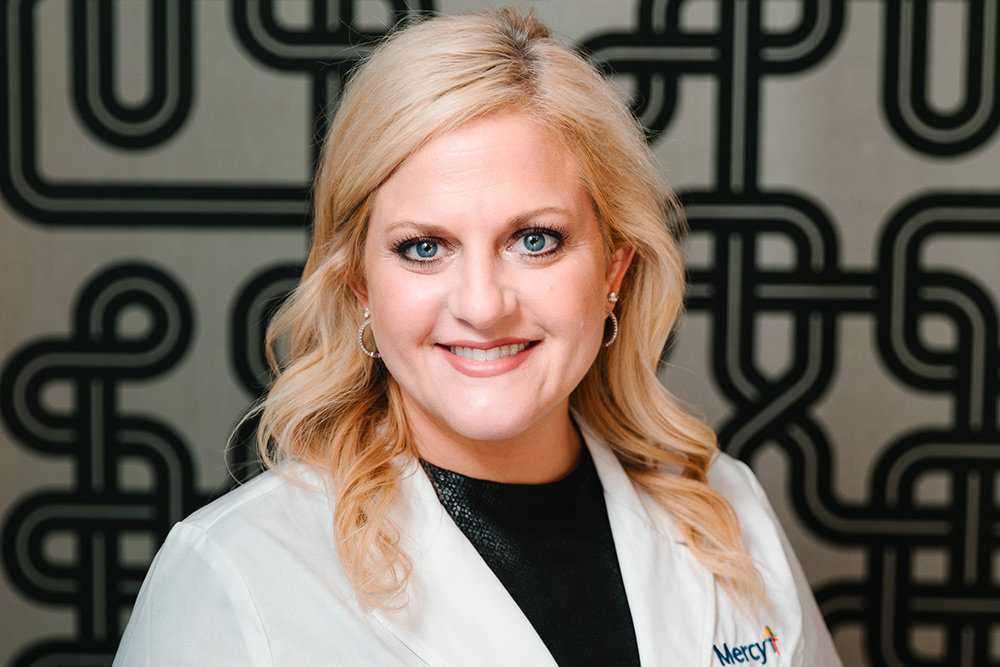YOUR BUSINESS AUTHORITY
Springfield, MO
YOUR BUSINESS AUTHORITY
Springfield, MO

Working in acute, emergency care, Dr. Kendra Morrison has a short window to gain her patients’ trust. And with some facing potentially life-threatening situations, those moments can have a major impact.
“I have to be quite frank with patients shortly after I introduce myself, but I always begin with empathy and compassion,” says Morrison, the medical director for Mercy Clinic Advanced Ambulatory Care. “Sometimes they are ready to change their destructive lifestyles, and sometimes they are just passing through and I have just enough time to patch them up. The key to caring is sharing information through basic education which propagates a lasting positive impact.”
She says there are often deeper issues beyond the main health concern that brings someone to her clinic. Looking at the bigger picture, she says, allows the care she delivers to be more efficient and effective.
Earlier this year, though, her work drastically changed as COVID-19 came to the Ozarks. She says her years in emergency medicine prepared her to face the novel virus. Morrison was a part of Mercy’s assessment early on by helping to develop an action plan for care, from patient contact to diagnosis.
“My team developed a plan to convert the entire clinic to accommodate only COVID patients and help off-load the mild (to) moderate sick people seeking care at our emergency department,” she says. “One of our goals was to inform the community where they should seek care depending on symptoms, intensity of the illness and safest level of care while reducing risk of contamination or infection.”
Morrison’s commitment to providing the best care with the most current techniques is what drives her career. During the COVID-19 pandemic, she has dedicated time daily to learn from respected physicians and educators on the changing treatments available as more is learned about the virus. That commitment to education extends to all patients in her care. In addition to COVID-19, she’s currently learning about alternative methods to treat acute illness, as well as the importance of prevention.
“Integrative medicine is something I was introduced to in medical school and has become very popular since the awareness of nutrition as medicine and the idea of staying well instead of just treating the disease,” she says. “Most patients want to do something to help them recover once they are infected or receive a diagnosis of a disease, and traditional medicine sometimes only offers limited answers. These adjunctive regimens give patients a more natural approach and provide the patient a sense of responsibility to boost their own recovery.”
Emergency care often requires a holistic approach, as well, as some patients are from low-income households or have been abused.
“I can remember several instances when I volunteered to pay for a safe ride home for the intoxicated college student or a late night call to a domestic shelter to provide a safe place to sleep for a domestic or sexual assault victim,” she says.
To help these patients, she was part of a team that collected clothes to give to sexual assault victims once they completed their forensic interviews, secured discounted rates at area hotels for families of trauma victims and, working with volunteers, started a program to give stuffed animals to children who come in for an emergency foster care exam.
“These examples are just a few of the reminders there might be something else or someone else impacted by this tragedy more than just the patient that is right in front of me,” she says.
Morrison has taken that intense care for patients far outside of Springfield. For the past five years, she has led medical missions trips with up to 45 fellow members of The Courageous Church.
“At times, I feel overwhelmed by the insurmountable number of people who do not have access to even basic medical care,” she says. “But everyone can do something, sometime, somewhere and make a difference, even for just someone. More often than not, the team and I are the ones that come back changed for the better.”
Missouri State University’s science building, built in 1971 and formerly called Temple Hall, is being reconstructed and updated.